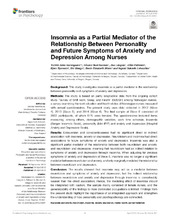| dc.contributor.author | Sørengaard, Torhild Anita | |
| dc.contributor.author | Karlsen, Håvard Rudi | |
| dc.contributor.author | Langvik, Eva | |
| dc.contributor.author | Pallesen, Ståle | |
| dc.contributor.author | Bjorvatn, Bjørn | |
| dc.contributor.author | Waage, Siri | |
| dc.contributor.author | Moen, Bente Elisabeth | |
| dc.contributor.author | Saksvik-Lehouillier, Ingvild | |
| dc.date.accessioned | 2019-06-07T11:21:50Z | |
| dc.date.available | 2019-06-07T11:21:50Z | |
| dc.date.issued | 2019-04-26 | |
| dc.Published | Sørengaard TA, Karlsen H. R., Langvik EL, Pallesen S, Bjorvatn B, Waage S, Moen BE, Saksvik-Lehouillier I. Insomnia as a partial mediator of the relationship between personality and future symptoms of anxiety and depression among nurses. Frontiers in Psychology. 2019;10:901 | eng |
| dc.identifier.issn | 1664-1078 | |
| dc.identifier.uri | https://hdl.handle.net/1956/19916 | |
| dc.description.abstract | Background: This study investigates insomnia as a partial mediator in the relationship between personality and symptoms of anxiety and depression. Methods: The study is based on partly longitudinal data from the ongoing cohort study “Survey of Shift work, Sleep, and Health” (SUSSH) among Norwegian nurses, a survey examining the work situation and health status of Norwegian nurses measured with annual questionnaires. The present study uses data collected in 2012 (Wave 4), 2013 (Wave 5), and 2014 (Wave 6). The final sample at Wave 6 consisted of 2002 participants, of which 91% were females. The questionnaires included items measuring, among others, demographic variables, work time schedule, insomnia (Bergen Insomnia Scale), personality (Mini-IPIP) and anxiety and depression (Hospital Anxiety and Depression Scale). Results: Extraversion and conscientiousness had no significant direct or indirect association with insomnia, anxiety or depression. Neuroticism and insomnia had direct associations to future symptoms of anxiety and depression. Insomnia was also a significant partial mediator of the relationship between both neuroticism and anxiety, and neuroticism and depression, meaning that neuroticism had an indirect relation to symptoms of anxiety and depression through insomnia. When adjusting for previous symptoms of anxiety and depression at Wave 5, insomnia was no longer a significant mediator between neuroticism and anxiety, and only marginally mediated the relationship between neuroticism and depression. Conclusion: The results showed that insomnia may act as a mediator between neuroticism and symptoms of anxiety and depression, but the indirect relationship between neuroticism and anxiety and depression through insomnia is considerably weaker than the direct association. Hence, the mediating effect of insomnia should be interpreted with caution. The sample mainly consisted of female nurses, and the generalizability of the findings to male dominated occupations is limited. Findings from the present study highlight the importance of an integrated approach and strengthen the understanding of how personality and psychopathology are connected. | en_US |
| dc.language.iso | eng | eng |
| dc.publisher | Frontiers | eng |
| dc.rights | Attribution CC BY | eng |
| dc.rights.uri | http://creativecommons.org/licenses/by/4.0 | eng |
| dc.subject | personality | eng |
| dc.subject | neuroticism | eng |
| dc.subject | insomnia | eng |
| dc.subject | anxiety | eng |
| dc.subject | depression | eng |
| dc.subject | mental health | eng |
| dc.subject | partial mediation | eng |
| dc.title | Insomnia as a partial mediator of the relationship between personality and future symptoms of anxiety and depression among nurses | eng |
| dc.type | Peer reviewed | |
| dc.type | Journal article | |
| dc.date.updated | 2019-04-26T09:15:44Z | |
| dc.description.version | publishedVersion | |
| dc.rights.holder | Copyright 2019 The Author(s) | eng |
| dc.identifier.doi | https://doi.org/10.3389/fpsyg.2019.00901 | |
| dc.identifier.cristin | 1691030 | |
| dc.source.journal | Frontiers in Psychology | |

